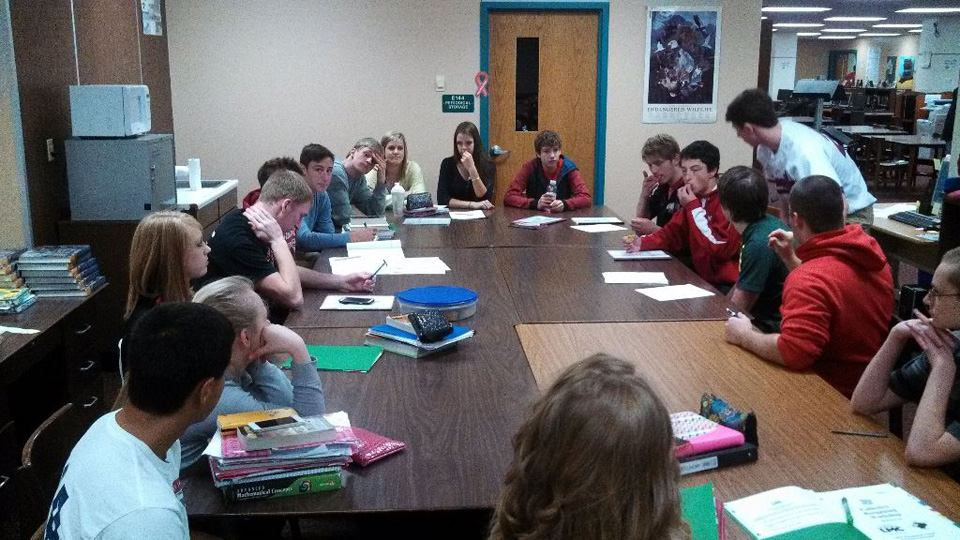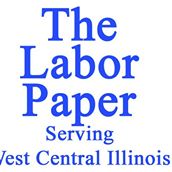
EAST PEORIA, Ill. (PAI) — The tried and true method of learning: Hands-on. Intellect helps discover and digest, but touching tools expands awareness and provides the all-important personal experience. The combination of a classroom atmosphere coupled with real-world actions imparts a valuable lesson to participants.
Almost 120 students from six Peoria-area high schools recently got both—especially the hands-on—for collective bargaining, thanks to the efforts and ability of Tom McLaughlin, a retired staff member for the Illinois Federation of Teachers (IFT). The goal: Negotiate a successor contract for a soon-to-expire 3-year collective bargaining agreement.
McLaughlin brought together volunteer coaches from organized labor and management in the Peoria area at the UAW Local 974 hall for the annual Regina Polk Labor Education program. Polk, an attorney active for workers’ rights, had died tragically in a plane crash.
DePaul University of Chicago led the charge to establish the program, says McLaughlin, its local facilitator “Professor Bob Breving set up the program more than 20 years ago as a way to bring labor to the schools,” he explained.
Though Breving has retired, DePaul continues to operate the program, which now reaches 3,000 students across Illinois annually. McLaughlin participated from its earliest days. He went to Chicago to serve as a coach for Breving. “It was a great experience and I could see it would work in our area,” he said.
Within just a few short years after the program began, Breving asked McLaughlin and another retired staffer if “we would do a program in Peoria,” McLaughlin says. “We started at Laborers Local 165 almost 20 years ago and have been at the Local 974 Hall for 12 years.”
The students, who arrive mid-morning and stay until early afternoon, split into two groups, half as management and half as organized labor. Both ‘sides’ have listed eight issues. While the negotiators have resolved half the issues, Labor and Management each have four unresolved issues. Each student then reads the information relevant to their position.
After a period of study and a strategy session for each team, the ‘talks’ begin. Coaches at the ‘bargaining table’ help guide the students. McLaughlin counts several retired teachers among the many volunteer coaches and “that helps,” he says. Members of several local unions and members of management from the state Transportation Department and Caterpillar’s Human Resources department also participate.
The students get a taste of what bargaining requires. “They can understand first-hand what it takes to reach an agreement,” McLaughlin says, adding, “and they experience working with people they don’t agree with.” Under the gentle guidance of the coaches the students are expected to come to an agreement. “Or at least make progress,” McLaughlin says.
Knowing groups could get stuck, “The folks from FMCS (Federal Mediation and Conciliation Service) are there to help the students from both labor and management,” says McLaughlin, “just as they do whenever they mediate” in real bargaining. The Peoria program began bringing in the FMCS after a few years. Now other programs statewide also include it.
The quality of students reflects and demonstrates the effectiveness of the program. Teachers choose which classes or students to bring. Typically the students have enrolled in classes such as Economics, History, or Current Events.
“We get feedback from teachers,” McLaughlin says, “that for the next three days of class after the program, all the students want to talk about is the program. There have even been classes that didn’t resolve all the issues that continued bargaining in class.”
When the program began, DePaul provided the funding. Now local labor, led by the building trades, and other organizations do. And McLaughlin says as the program encourages the compromise necessary to reach an agreement, corporate sponsors recently have expressed interest in providing funding.
As another Polk Program slides across the sunset, McLaughlin says he’ll be there again next year. “I enjoy helping to put this all together. We think it has been so successful due in large part to the tremendous support we get from both local management and local labor.”

MOST POPULAR TODAY

Zionist organizations leading campaign to stop ceasefire resolutions in D.C. area

High Court essentially bans demonstrations, freedom of assembly in Deep South

Communist Karol Cariola elected president of Chile’s legislature

U.S. imperialism’s ‘ironclad’ support for Israel increases fascist danger at home







Comments